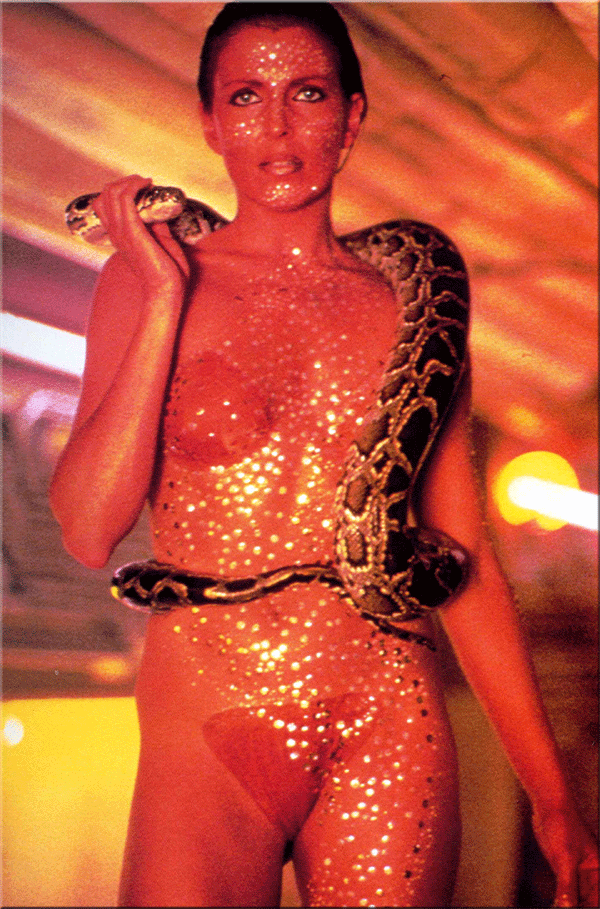Ridley Scott’s 1982 film, Blade Runner, maintains a plotline in which the “blade runners” are out to “retire” the replicants, or the genetically created humanoids of the Nexus 6 Corporation, led by Tyrell. The film places Rick Deckard in charge of the mission to retire several known replicants, or “androids” on earth, before they find a way to extend their lifespan. His job in the film is to consider the androids completely unhuman, or as W.A. Senior says in his article, “Blade Runner and Cyberpunk Visions of Humanity,” they are, “genefically engineered beings designed for special tasks and purposes deemed too difficult, demeaning, or dangerous for normal humans.” Deckard is not to have any respect for the androids—they are outcasts and not welcome on earth. As senior says, his job is to limit both their choices and their lives. The twist, however, is that Deckard has a deep concerns about the question of where humankind leaves off or begins. Senior says that, “Replicants were built to be human in almost every way, yet they are denied human status, like many of the others who cannot qualify for off-world placement, in a technologically racist society that views them as disposable slaves.” We become aware in the film that Deckard holds a slightly different opinion than his boss, Bryant, who has given him the mission to retire the androids. We find out that Bryant has a history of being racist. Deckard, while remaining on his mission and following through with several retirements, does however question how much difference there really is between the replicants and humans. This is obvious in his love affair with Rachel, a replicant who does not believe she is. As Senior describes it, “The beginning of Deckard's affair with Rachel demonstrates both her urgent passion and his own need for love and comfort…Moreover, the situations, behaviors, reactions, and needs of the replicants parallel or exceed in intensity those of the few humans in the film.” Deckard and the replicants share similar attributes- all characters with personal strengths and weaknesses. The film deals with the replicants in an interesting way—labeling them as outcasts or illegal prisoners of earth. However, a different view is offered— one that places the replicants and humans on a more equal level. This is done through Deckard’s character, and is highlighted intensely through his relationship with Rachel. The end of the film, with Rachel and Deckard leaving off together, depicts this theme even further.
Showing posts with label Blade Runner. Show all posts
Showing posts with label Blade Runner. Show all posts
Sunday, December 5, 2010
Moises, Blade Runner

Blade Runner is a film that blurs the lines of moral relativism within humanity. In the film, we have a genetically engineered group of beings known as replicants. These replicants look and seem just like humans, but they possess superior strength and knowledge. Because of killings by a group of replicants, they eventually became banned on Earth and deemed outcasts. But who is the real outcast here? Is it the replicant, who is seemingly carrying out its life plan the only way it knows how (like a human), or is it the Tyrell Corporation that created the replicants in the first place. To me, Blade Runner is attempting to convey the evils that corporations stand for, and how worse they could eventually get. Today, corporations are slowly getting to the point of the Tyrell Corporation, which creates beings that are "more human than humans". That means that a single corporation is altering humanity, leaving them in charge. I'm pretty sure most can agree when I say I don't like the idea of a corporation altering the way we know humanity.
It's interesting to point out some folklore that has developed since the release of Blade Runner. Many companies whose logos were displayed as product placements in the film went on to experience great economic downfall. RCA, Atari, Regional Bell, Pan-Am, and Coca-Cola all had some kind of setback after the release of the film. It seems that Ridley Scott, knowingly or not, not only got his point across, but also put it into action.
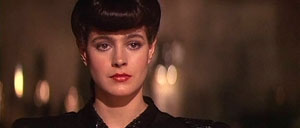
Sunday, November 14, 2010
Griffin- Adam Savage's "Blade Runner"
In Adam Savage’s article on “Blade Runner,” his favorite film, he dissects the film’s technology and mise en scene to show the timeless merit of the movie. He maintains that despite more advanced and sophisticated sci-fi films like “Matrix” and “Star Wars” that came after, “Blade Runner surpasses anything that’s been done since.” Movies in this genre rely heavily on special effects and CGI for their mass appeal, so how can “Blade Runner” still shine as a movie superior to its more technologically advanced descendants?
Ridley Scott was resourceful with the technology available to him, like model mastery and motion control, using it to create a world in which the viewer feels very much apart and grounded. These techniques might not seem appealing to filmmakers today but the older methods cannot be forgotten in favor of newer devices. All of the technology in “Blade Runner” serves the greater purpose of the story, and the narrative, the most central device in any movie. The very story itself cannot be obscured or neglected to special affects, which this film avoids. “Blade Runner” is timeless and successful because the character arch of Rick Deckard is complete and the themes followed through. The technology that creates the dystopian megalopolis of the future allows the viewer to inhabit the setting intimately, but our focus remains on the profound conflict of what is human and who has the power to give and take away life. Sci-fi films of today would do well to remember “Blade Runner” and mimic its ability to dazzle with CGI and the like while also being able to communicate a story that resonates in the real world.
Sunday, November 7, 2010
Fisher: Blade Runner
In this film we have a setting that takes place in the future after a nuclear apocalypse in a derelict Los Angeles in 2019. The world now has a hierarchy within this dystopia, and as we see in the scene between Rick Deckard (Harrison Ford) and his former supervisor Bryant (M. Emmet Walsh) when Deckard originally refuses the job to "retire" rogue androids but is forced to accept because if your not a cop, your a little person. This reflects on the levels of hierarchy left in the world. It is still based upon economics and status still but it has an extremely large gap between the rich (Tyrell Corporation), the cops, and those who speak "gutterspeak", the commoners. Below all of this we finally have the androids, made by the Tyrell Corporation. These beings are considered the low of the low, not even human, even though they are techinically more than human or the epitome of human perfection. In fact, they do not execute rogue androids, but rather have them retired in a somewhat violent fashion as we see in one of the better scene's from the film when Deckard chases down and retires Zhora (Joanna Cassidy), one of the androids illegally on earth.
So if all of this trouble is being cause by these androids, why do they make them? Why do they constantly improve them to be even more human? Why are the laws not changed to accommodate these anomalies? Why do we see that these androids have emotion and want to live? It is possible to determine if someone is an android by using the Voight-Kampff test, which measures bodily functions such as breathing, blushing, heart rate and iris and pupil dilation in response to emotionally provocative questions which should not trigger a response in a android. Which could lead us down another route in trying to determine what is human. In Blade Runner apparently a human is determined by its emotional responses according to the V-K test. However, we see Rachael (Sean Young) cry after we receive the knowledge that she is an android. Also, do our memories make us human? In Blade Runner, Rachel has memories that are apparently not her own and rather Tyrell's niece's, making her much less likely to be human. Yet at the end of the film it is demonstrated that the androids have memories of there own, and despite having a four year lifespan, they desire to live longer.
Roy Batty (Rutger Hauer)
So if all of this trouble is being cause by these androids, why do they make them? Why do they constantly improve them to be even more human? Why are the laws not changed to accommodate these anomalies? Why do we see that these androids have emotion and want to live? It is possible to determine if someone is an android by using the Voight-Kampff test, which measures bodily functions such as breathing, blushing, heart rate and iris and pupil dilation in response to emotionally provocative questions which should not trigger a response in a android. Which could lead us down another route in trying to determine what is human. In Blade Runner apparently a human is determined by its emotional responses according to the V-K test. However, we see Rachael (Sean Young) cry after we receive the knowledge that she is an android. Also, do our memories make us human? In Blade Runner, Rachel has memories that are apparently not her own and rather Tyrell's niece's, making her much less likely to be human. Yet at the end of the film it is demonstrated that the androids have memories of there own, and despite having a four year lifespan, they desire to live longer.
Roy Batty (Rutger Hauer)
Isaacson: Blade Runner

The central element of Blade Runner is the ambiguity of humanity and the human experience. Occurring in dystopic future where science and technology has greater power over culture than the dreams of the people that inhabit it. In this future humans have perfected "replicants," artificial persons who are exploited by "real" humans as commodities despite the claim by their maker, the Tyrrell Corporation, that they are "more human than human." Humans also remove two of the primary lifelong motivators from the replicants, the ability to have pass on pieces of themselves through offspring and the uncertainty of death, because they cannot reproduce and they have a four year lifespan. This is similar to the controls placed on AIs in William Gibson's Neuromancer and it comes to a similar conclusion; replicants are banned on Earth and an found are "terminated" by a Blade Runner, a police officer specifically trained and authorized to kill replicants.
However, despite theses small differences, the film is incredibly ambiguous as to who really is human. It's obvious that the replicants Deckard, the protagonist and highly skilled Blade Runner, has been hired to terminate are not human; also clear is Rachel's status as a replicant. However, the humanity of ever other character in the film is open to interpretation. We are told by Tyrrell, with the introduction of Rachel, that she believes herself to be human and had false memories of her life before her manufacture implanted so that she might be more human, or at least more emotionally controllable. Both of the Blade Runners, Deckard and Gaff, are solitary men that do not have familial connection and that share many of the eccentricities of the replicants. For example, replicants become heavily emotionally involved with certain objects, perhaps because of the very limited time they have to interact with them; everywhere that Gaff goes he makes an origami figure out of available everyday objects, a bizarre sentimentalization of objects and wish for a personal history when considering this hardened killer. Through this we are also given one of our biggest clues for Deckard identity as a replicant; he dreams/remembers a sequence where a unicorn is running through a field and the final origami that Gaff leaves him is a unicorn, suggesting that Deckard's memories or desires are a scientific matter of filed data which Gaff has access to in the same way that he had access to Rachel's memories. Other characters in the film, from Bryant to Tyrrell himself, are circumspect in their humanity, particularly since none of them can be sure of their own humanity either. Thus, the line between replicant and human is blurred to the point where lifespan and involved emotional response are the only real indicators of the difference; the continued discrimination against replicants is not a matter of their inhumanity but of their inability to effectively fight back given their four year lifespan. They are useful to the ambitions of "real" humans so, much like our slaves now and historically, their humanity is not an issue that the slavemaster is concerned with.
Glickert, Blade Runner
The 1982 Ridley Scott film, Blade Runner, is a science-fiction thriller based on a Philip K. Dick short story concerning genetically-engineered organic robots, or "Replicants". The film takes place in Los Angeles, year 2019. The replicants were created by the Tyrell Corporation to perform slave-like work in off-world colonies. The government has banned the use of and even the existence of replicants on planet Earth. Special police forces known as "Blade Runners" have been hired to track down replicants illegally roaming the Earth. The main scientific difference - as well as the basis for philosophical difference - between humans and replicants is that the designed lifespan of a replicant is limited to four years, presumably preventing them from developing emotional feelings. The story's protagonist, retired police officer Rick Deckard, agrees to an assignment as a Blade Runner. He uses the replicants' proposed lack of emotional feelings as a means to uncover illegal replicants through a series of questions that are intended to induce emotion in non-replicants.
The philosophical aspect of the film centers around the question of what exactly is a human, and what is the proper indicator of humanity. The tests that Deckard performed were based on emphatic measures, but the dim representation of Los Angeles showed deficient compassion by "real" humans. In addition, many replicants actually showed signs of compassion toward each other, despite the preventative measures (4-year lifespans) put in place by Tyrell. The film even offers doubt as to whether Deckard is actually human himself. To me, this begs a few questions. First, in this grim, semi-apocalyptic world, to what extent does it matter if someone is produced "naturally" or "manufactured". In respect to the world today, we are seeing a strong decrease in natural/traditional births with advancements in science. Second, who should be the one to decide whether replicants are "good" or "bad", "right" or "wrong". If the world were to succumb to such a morally corrupt state like Scott represented, then I don't see any justification for one to say that replicants are bad or wrong, because they are in no way worse than "natural" humans in terms of harm done to society and to themselves.
The philosophical aspect of the film centers around the question of what exactly is a human, and what is the proper indicator of humanity. The tests that Deckard performed were based on emphatic measures, but the dim representation of Los Angeles showed deficient compassion by "real" humans. In addition, many replicants actually showed signs of compassion toward each other, despite the preventative measures (4-year lifespans) put in place by Tyrell. The film even offers doubt as to whether Deckard is actually human himself. To me, this begs a few questions. First, in this grim, semi-apocalyptic world, to what extent does it matter if someone is produced "naturally" or "manufactured". In respect to the world today, we are seeing a strong decrease in natural/traditional births with advancements in science. Second, who should be the one to decide whether replicants are "good" or "bad", "right" or "wrong". If the world were to succumb to such a morally corrupt state like Scott represented, then I don't see any justification for one to say that replicants are bad or wrong, because they are in no way worse than "natural" humans in terms of harm done to society and to themselves.
Kozaites, The Outcasts in Blade Runner
 In 'Blade Runner', version notwithstanding, the outcasts are not just the replicants as one might initially assume. It could very well be construed that the majority of the characters in the film are the outcasts considering that they cannot live on the off world. Thereby, they can all be seen as imprisoned in 2019 Los Angeles with Tyrell as their warden.
In 'Blade Runner', version notwithstanding, the outcasts are not just the replicants as one might initially assume. It could very well be construed that the majority of the characters in the film are the outcasts considering that they cannot live on the off world. Thereby, they can all be seen as imprisoned in 2019 Los Angeles with Tyrell as their warden.In any case, the replicants are the outcasts of the outcasts in the movie. It is then important to ask why the replicants are the outcasts- because they are not human. But as W.A. Senior discusses in "Blade Runner and the Cyberpunk Visions of Humanity" the replicants display all the traits of humanity: fight for survival, compassion for loved ones, and other emotions. In fact, the relpicants are almost super versions of humans. This is why they are hunted, and considered the outcasts, because there are so few of them, yet they are so powerful.
Having these killer replicants on earth would surely scare Tyrell, who having sway over the police department, has them declared illegal.
Rickert, Blade Runner
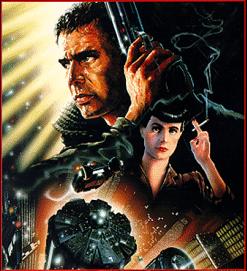
The film Blade Runner deals with the out casted android in a futuristic dystopian society. The android outcasts are called replicantes. The replicates were engineered to serve as soldiers in the off world colonies. Their life span last 4 years because of this short lifespan, they are unable to have the same emotional feelings as humans. In the film, four replicants escape to Earth, and Harrison Ford is contracted to “retire” them. This destruction is the method of removal and treatment of these outsiders (replicants). The society urgency to remove these outsiders stems from different factors. There is an apparent fear of the replicants, mainly because they are different. The humans fear their intelligence, for the replicants intelligence may supersede the humans own intelligence. The replicant Rachel however, seems to have developed emotions that other replicants have not been able to. In the article, Bladerunner and carpunk versions of Humanity, “Deckard thinks to himself that "Replicants weren't supposed to have feelings, but neither were bladerunners." Yet it is clear that both do and develop powerful emotions through contact with others. And "in science fiction the ultimate sign of the human" is the expression of "emotions and feelings" (Bruno 61). This explores the ideal of the replicants actually being humans because the presence of emotions, although they did not originate in the same manner as real humans. This debate of replicants as actually humans echoes current discussion of the morality of abortion and stem cell research. The human fear of “outsiders” is followed by the immediate destruction and removal of these “outsiders”. The movie blade runner mirrors the innate human fear of the creation of technology that could possibly one day be more intelligent and stronger than humans.
Saturday, November 6, 2010
Barkley, Blade Runner, Replicants
Blade Runner is a science fiction film set in the dystopian Los Angeles in the year 2019. In this film there are replicants, who are biologically engineered humans designed to serve as soldiers in the off world colonies. These replicants are considered the outcast, as they are not permitted on earth. They have a life span of 4 years in order to prevent them from developing emotions and a desire for independence. 4 replicants have escaped to earth and Harrison Ford's character is contracted to hunt them down and "retire" them. This is how Blade Runner deals with the outcast: extinction. In order to determine whether people are real humans or replicants, they are subject to an empathy test, which proves one's authenticity as a human.
In the film, Ford's boss Bryant reports “I’ve got four skin-jobs, walking the streets,” this echos throughout the streets for all to hear. This displays the way the replicants were treated in this film, as unwanted outsiders. Replicants who were found on earth were to be "retired" by blade runners. Replicants can be seen as the minority in this film.
This film brings up many unanswered questions, like is empathy the only thing that makes us human? These questions leave the viewer wondering, which in turn leaves the viewer thinking about Blade Runner.
In the film, Ford's boss Bryant reports “I’ve got four skin-jobs, walking the streets,” this echos throughout the streets for all to hear. This displays the way the replicants were treated in this film, as unwanted outsiders. Replicants who were found on earth were to be "retired" by blade runners. Replicants can be seen as the minority in this film.
This film brings up many unanswered questions, like is empathy the only thing that makes us human? These questions leave the viewer wondering, which in turn leaves the viewer thinking about Blade Runner.
Himmelberg, Blade Runner Blog

Blade Runner is a very interesting sci-fi movie that dives into one possible future for planet earth and us. It is so weird to see how someone percieves what the future will be like and how we will percieve human life. In this movie they have two different types of beings, Humans and Replicants. Replicants are like humans except that they are only replications of humans or clones of humans, they have a set lifespan and are supposed to not have or show any emotions. They deal with the android by using it for their own purposes (to populate the new frontier, do the dirty work much like slaves) and then killing them (either physicially because they have gone arye or by giving them a set very short lifespan of 4 years). They seem to disregard that replicants are ,in almost every respect, the same or better than humans and therefore should be treated with similar standards. It goes back to the idea of slavery , why does one person or one group of people have the right to rule over others and make them do anything. The only real differenctiation is that replicants are "made" by humans so some may think that if you create something then you have some authority over them(when you have children you are responsible for them and have authority to tell them what to do), but on the other hand you do not have authority over them forever, if you treat them like a child, then you have to nuture the replicants and then let them live just like us, side by side with us. In Blade Runner, they simply believe that the replicants are lower and inferior to them, but the replicants don't like this and they want to control their own lives, much like any human does.
In the article "Blade Runner and Cyberpunk Visions of Humanity" by W.A. Senior, he talks about how the ideas of Humanity are blurred. In the article he says that the movie simply magnifies the extremes of humanity, from the dirty street rats found on earth in the dilapidated Los Angelos to the superhuman replicants, which are what humans strive to and have always wanted to be. It is funny that on both sides of the spectrum the middle "normal" people are controlling both sides both the lowly ones and the superhuman ones. It seems to say that it doesn't matter what you have we as humans will alwasy try to control others and rule over others. Especially the ones who are different from us.
Phillpott--Blade Runner and Replicants
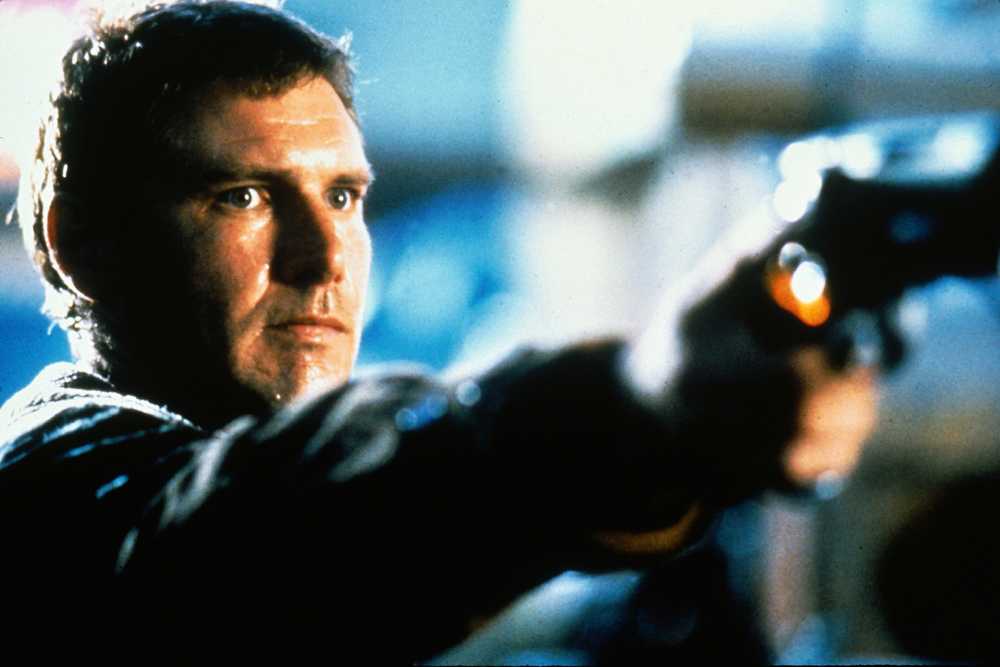
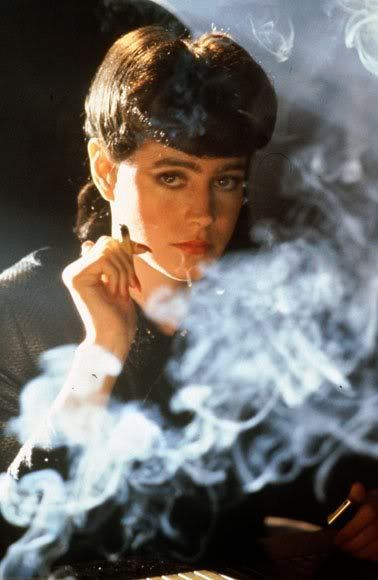 The movie Blade Runner deals with the complex question of what make someone (or something) human? In Blade Runner, there are Replicants (humanoid robots) that live amongst the post-apocalyptic Los Angeles community. According to "A Film Pro Dissects Sci-Fi F/X Unsurpassed after 25 years," the Replicants are genetically engineered humanoids that do the hard work on off-world colonies. They were made by the Tyrell Corporation, but are difficult to distinguish from “real” humans. They have all the qualities of humans. They have emotions, and they are able to communicate and live amongst the “real” humans (those born “naturally) without giving their true identities away. They act like they are human, and in the case of Rachel, she doesn’t even know that she is a Replicant.
The movie Blade Runner deals with the complex question of what make someone (or something) human? In Blade Runner, there are Replicants (humanoid robots) that live amongst the post-apocalyptic Los Angeles community. According to "A Film Pro Dissects Sci-Fi F/X Unsurpassed after 25 years," the Replicants are genetically engineered humanoids that do the hard work on off-world colonies. They were made by the Tyrell Corporation, but are difficult to distinguish from “real” humans. They have all the qualities of humans. They have emotions, and they are able to communicate and live amongst the “real” humans (those born “naturally) without giving their true identities away. They act like they are human, and in the case of Rachel, she doesn’t even know that she is a Replicant.In Blade Runner, the Replicants are subjected to a “human” test to prove whether or not they are Replicants. In the movie, the androids are seen as being below humans socially. Yet, the irony is that the Replicants seem more human than the real humans. They only have a four year life-span so they live each moment to the fullest. They don’t hold back on their emotions like the humans in the movie do.
So, their behavior begs the question of what is human? Are you a human solely based on genetics, or can you be human if you were made by humans? Is being human defined by your actions in life, or by being born from a human mother? I think this movie does a great job with exploring this question. The idea of human should not be restricted to our limited understanding. Blade Runner truly proves that the Replicants are more human than humans.
Subscribe to:
Posts (Atom)



